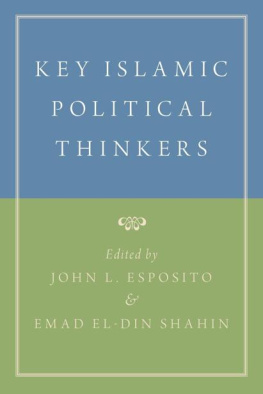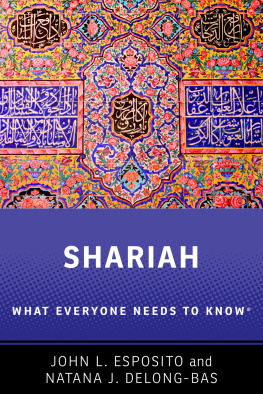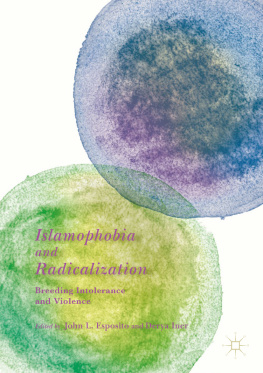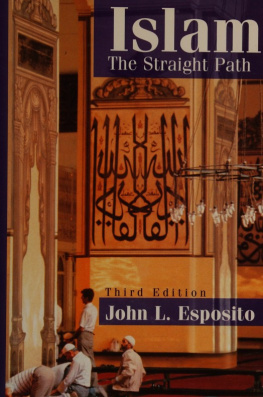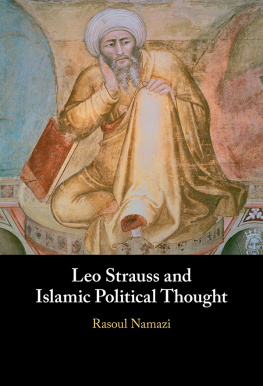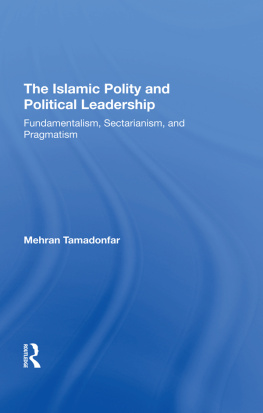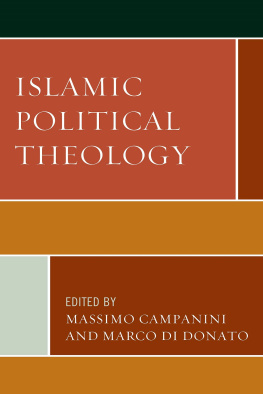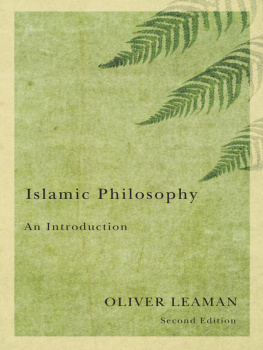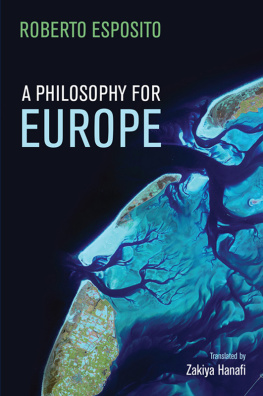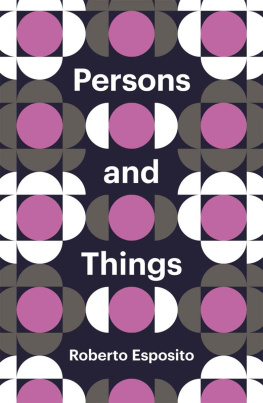John L. Esposito - Key Islamic Political Thinkers
Here you can read online John L. Esposito - Key Islamic Political Thinkers full text of the book (entire story) in english for free. Download pdf and epub, get meaning, cover and reviews about this ebook. year: 2018, publisher: Oxford University Press, genre: Politics. Description of the work, (preface) as well as reviews are available. Best literature library LitArk.com created for fans of good reading and offers a wide selection of genres:
Romance novel
Science fiction
Adventure
Detective
Science
History
Home and family
Prose
Art
Politics
Computer
Non-fiction
Religion
Business
Children
Humor
Choose a favorite category and find really read worthwhile books. Enjoy immersion in the world of imagination, feel the emotions of the characters or learn something new for yourself, make an fascinating discovery.
- Book:Key Islamic Political Thinkers
- Author:
- Publisher:Oxford University Press
- Genre:
- Year:2018
- Rating:4 / 5
- Favourites:Add to favourites
- Your mark:
- 80
- 1
- 2
- 3
- 4
- 5
Key Islamic Political Thinkers: summary, description and annotation
We offer to read an annotation, description, summary or preface (depends on what the author of the book "Key Islamic Political Thinkers" wrote himself). If you haven't found the necessary information about the book — write in the comments, we will try to find it.
Key Islamic Political Thinkers — read online for free the complete book (whole text) full work
Below is the text of the book, divided by pages. System saving the place of the last page read, allows you to conveniently read the book "Key Islamic Political Thinkers" online for free, without having to search again every time where you left off. Put a bookmark, and you can go to the page where you finished reading at any time.
Font size:
Interval:
Bookmark:
Edited by John L. Esposito
and
Emad El-Din Shahin


Oxford University Press is a department of the University of Oxford. It furthers the Universitys objective of excellence in research, scholarship, and education by publishing worldwide. Oxford is a registered trade mark of Oxford University Press in the UK and in certain other countries.
Published in the United States of America by Oxford University Press
198 Madison Avenue, New York, NY 10016, United States of America.
Oxford University Press 2018
The essays in this volume were originally published in The Oxford Handbook of Islam and Politics
All rights reserved. No part of this publication may be reproduced, stored in a retrieval system, or transmitted, in any form or by any means, without the prior permission in writing of Oxford University Press, or as expressly permitted by law, by license, or under terms agreed with the appropriate reproduction rights organization. Inquiries concerning reproduction outside the scope of the above should be sent to the Rights Department, Oxford University Press, at the address above.
You must not circulate this work in any other form and you must impose this same condition on any acquirer.
Library of Congress Cataloging-in-Publication Data
Names: Esposito, John L., editor. | Shahin, Emad Eldin, 1957- editor.
Title: Key Islamic political thinkers / edited by John L. Esposito and Emad El-Din Shahin.
Description: New York, NY : Oxford University Press, 2018. | Includes index.
Identifiers: LCCN 2018013406 (print) | LCCN 2018015122 (ebook) | ISBN 9780190900366 (updf) | ISBN 9780190900373 (epub) | ISBN 9780190900359 (pbk.) | ISBN 9780190900342 (hardcover)
Subjects: LCSH: Political science-Islamic countries. | Political science-Philosophy. | Islam and politics.
Classification: LCC JA84.I78 (ebook) | LCC JA84.I78 K49 2018 (print) | DDC 320.55/70922dc23
LC record available at https://lccn.loc.gov/2018013406
1 3 5 7 9 8 6 4 2
Paperback printed by WebCom, Inc., Canada
Hardback printed by Bridgeport National Bindery, Inc., United States of America
Part I
Founders of Political Islam
Chapter 1: Hassan al-Banna
Ahmad Moussalli
Chapter 2: Mawlana Mawdudi
Joshua T. White and Niloufer Siddiqui
Part II
Revolutionary Ideologues
Chapter 3: Sayyid Qutb
Shahrough Akhavi
Chapter 4: Ali Shari`ati
Shahrough Akhavi
Chapter 5: Ayatollah Khomeini
Mojtaba Mahdavi
Part III
The Intellectuals of Political Islam
Chapter 6: Hassan al-Turabi
Peter Woodward
Chapter 7: Rashid al-Ghannushi
Azzam Tamimi
Chapter 8: Yusuf al-Qaradawi
Bettina Grf
Chapter 9: Mohammad Khatami
Mahmoud Sadri and Ahmad Sadri
Chapter 10: Abdolkarim Soroush
Behrooz Ghamari-Tabrizi
Due to variance in usage, rather than attempt to impose a style of transliteration across the entire volume, we have allowed each author to transliterate foreign-language terms according to his or her stylistic preference.
The purpose of this book is to help readers understand the different streams within contemporary Muslim political thought. Each essay in this book explores the work of a key twentieth-century Islamic thinker whose influence stretches beyond his home country. Many of these figures are still active, and their thought continues to affect thousands of Muslims. The choice of a specific time frame should not indicate any discontinuity in the intellectual stream within Muslim societies. In fact, we see the evolution of Muslim political thought as a continuous process that in a few cases manifests a clear organic connection. For example, one can trace a continuous path from the Islamic reformer Jamal al-Din al-Afghani (18381879) to Muhammad `Abduh (18491905), Muhammad Rashid Rida (18651935), Hassan al-Banna (19061949), and todays Muslim Brothers. Similar connections can be easily traced between generations of intellectuals in other parts of the Muslim world, not only chronologically but also across borders as certain intellectuals or movements in one country see themselves as the heirs of reformers in another.
Obviously, the context in which this discourse evolved has been extremely important. The last two centuries have been vibrant yet turbulent and unsettling. Three transformative developments had the greatest bearing on Islamic political thought: the decline of the old order and eventual collapse of the caliphate; colonial occupation and the continuation of external hegemony; and the rise of secular Muslim intellectuals and secular movements. They were accompanied by the demise of the old legal and social structures (the old order); the emergence of nation-states; increased westernization and modernization; the creation of Israel and repeated defeats and humiliations of Muslims; the rise of Islamic revival movements; globalization; and the rise of nonstate actors and resistance.
This book focuses on key Muslim intellectual figures from various schools of contemporary political Islam. Political Islam here refers to attempts by individuals, groups, and movements to reconstruct the political, economic, and social dimensions of their societies along Islamic lines, including an orientation toward shari`a and an approach to the questions of whether and how to establish an Islamic state. Given the countless number of Muslim intellectuals who have emerged over the past century and a half seeking to reform Islam from within, no single volume could hope to offer an exhaustive survey of Islamic political thought. Instead, we have chosen a selection of thinkers that is, we think, representative of the main streams in contemporary Muslim political thought and of its principal themes. We have divided those thinkers into three main categories: the founders of political Islam, revolutionary ideologues, and the intellectuals of political Islam. Hassan al-Banna and Abu al-A`la al-Mawdudi are rightly considered the forefathers of contemporary political Islam. Both reinterpreted the faith to make religion a vehicle for social and political action. This understanding became a common feature of political Islam. For al-Banna and Mawdudi the fulfillment of
Font size:
Interval:
Bookmark:
Similar books «Key Islamic Political Thinkers»
Look at similar books to Key Islamic Political Thinkers. We have selected literature similar in name and meaning in the hope of providing readers with more options to find new, interesting, not yet read works.
Discussion, reviews of the book Key Islamic Political Thinkers and just readers' own opinions. Leave your comments, write what you think about the work, its meaning or the main characters. Specify what exactly you liked and what you didn't like, and why you think so.

